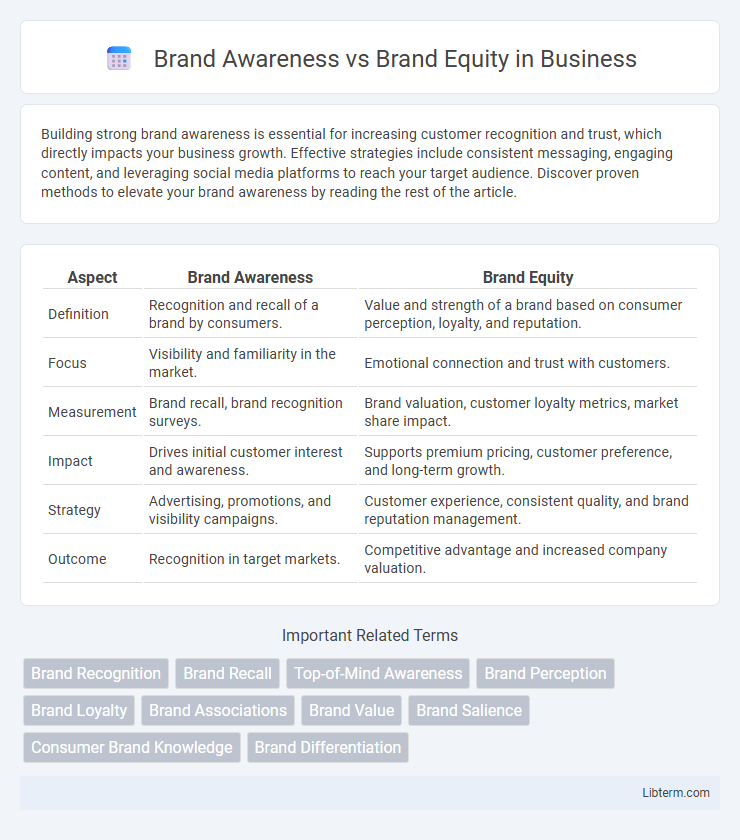Building strong brand awareness is essential for increasing customer recognition and trust, which directly impacts your business growth. Effective strategies include consistent messaging, engaging content, and leveraging social media platforms to reach your target audience. Discover proven methods to elevate your brand awareness by reading the rest of the article.
Table of Comparison
| Aspect | Brand Awareness | Brand Equity |
|---|---|---|
| Definition | Recognition and recall of a brand by consumers. | Value and strength of a brand based on consumer perception, loyalty, and reputation. |
| Focus | Visibility and familiarity in the market. | Emotional connection and trust with customers. |
| Measurement | Brand recall, brand recognition surveys. | Brand valuation, customer loyalty metrics, market share impact. |
| Impact | Drives initial customer interest and awareness. | Supports premium pricing, customer preference, and long-term growth. |
| Strategy | Advertising, promotions, and visibility campaigns. | Customer experience, consistent quality, and brand reputation management. |
| Outcome | Recognition in target markets. | Competitive advantage and increased company valuation. |
Understanding Brand Awareness
Brand awareness refers to the extent to which consumers recognize and recall a brand, playing a crucial role in influencing purchase decisions and loyalty. It encompasses brand recognition, where consumers identify the brand from visual or audio cues, and brand recall, which measures the ability to remember the brand without prompts. High brand awareness lays the foundation for building brand equity by increasing consumer trust, perceived quality, and emotional connection with the brand.
Defining Brand Equity
Brand equity refers to the value and strength of a brand perceived by consumers, influenced by factors such as brand recognition, customer loyalty, perceived quality, and brand associations. It represents the premium a company can command due to the brand's reputation and emotional connection with its audience. While brand awareness measures how familiar consumers are with a brand, brand equity captures the overall impact of that awareness on consumer behavior and business performance.
Key Differences Between Brand Awareness and Brand Equity
Brand awareness measures how familiar consumers are with a brand's name and its products, impacting initial recognition and recall. Brand equity reflects the overall value and perception of the brand in the market, shaped by consumer experiences, loyalty, and associations. Key differences include awareness being an antecedent to equity, where awareness drives consideration, while equity influences pricing power and competitive advantage.
The Role of Brand Awareness in Marketing Strategy
Brand awareness serves as the foundation for building brand equity by ensuring that consumers recognize and recall a brand in a competitive market. High brand awareness increases customer trust and influences purchasing decisions, making it a critical component of effective marketing strategies. Marketers leverage brand awareness to enhance brand loyalty and create long-term value, ultimately strengthening overall brand equity.
How Brand Equity Impacts Business Growth
Brand equity directly influences business growth by enhancing customer loyalty, enabling premium pricing, and increasing market share through positive brand recognition and perceived value. Strong brand equity reduces marketing costs and fosters trust, leading to higher customer retention and expanded revenue streams. Companies with substantial brand equity experience accelerated growth as their brand becomes a competitive advantage in both new and existing markets.
Building Brand Awareness: Effective Strategies
Building brand awareness involves leveraging targeted social media campaigns, search engine optimization (SEO), and influencer partnerships to increase visibility and recognition among target audiences. Consistent messaging across multiple platforms enhances recall, while engaging content fosters emotional connections that drive memorable brand experiences. Metrics such as brand recall, reach, and impressions provide critical insights into the effectiveness of awareness-building efforts.
Strengthening Brand Equity: Proven Methods
Strengthening brand equity involves consistently delivering high-quality products and fostering positive customer experiences that enhance perceived value and trust. Implementing strategic brand positioning and leveraging emotional connections through targeted marketing campaigns increases brand loyalty and differentiation in competitive markets. Monitoring customer feedback and adapting to market trends further solidifies brand equity by ensuring the brand remains relevant and resonates deeply with the target audience.
Measuring Brand Awareness vs Brand Equity
Measuring brand awareness involves evaluating metrics such as brand recall, recognition, and reach through surveys and social media analytics to determine how well consumers identify a brand. In contrast, measuring brand equity assesses the perceived value and strength of the brand using factors like customer loyalty, price premium, and financial performance indicators. Tools like Net Promoter Score (NPS) and brand valuation models play a crucial role in quantifying brand equity beyond mere visibility.
The Relationship Between Brand Awareness and Brand Equity
Brand awareness directly influences brand equity by establishing consumer recognition and recall, which forms the foundation for perceived value and loyalty. Higher brand awareness increases customer trust and preference, enhancing overall brand equity through stronger emotional connections and more consistent purchasing behavior. Effective brand awareness strategies contribute to building brand equity by differentiating the brand in competitive markets and driving long-term profitability.
Which Matters More: Brand Awareness or Brand Equity?
Brand Equity matters more than Brand Awareness because it represents the perceived value and emotional connection consumers have with a brand, leading to customer loyalty and higher profitability. While Brand Awareness is crucial for initial recognition, it does not guarantee customer preference or long-term success without strong Brand Equity. Brands with high equity can command premium prices and withstand competitive pressures, making Brand Equity the key driver of sustainable business growth.
Brand Awareness Infographic

 libterm.com
libterm.com